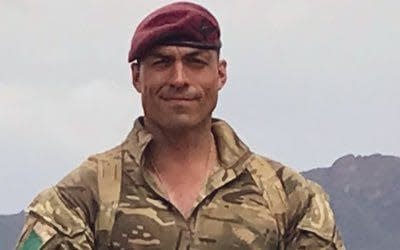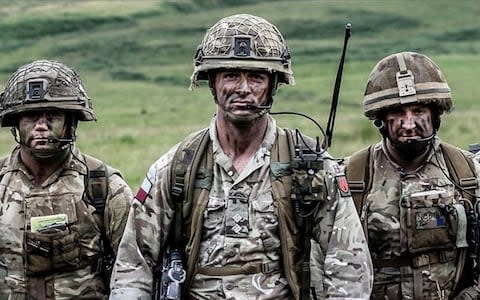Soldiers' use of social media to discuss problems makes them 'mentally more resilient', says Parachute Regiment Major

Soldiers are being encouraged to use social media to talk about battlefield experiences to help them overcome mental health challenges, a Parachute Regiment Major has revealed.
Soldiers' use of social media to discuss personal problems makes them more resilient and better fighters as a result, Major Andrew Fox has said.
He believes the MoD’s “deliberately relaxed” attitude to service personnel using social media is slowly getting rid of the stigma around mental health.
The MoD’s social media policy has signalled a shift away from a blanket ban on troops’ communicating publicly. As long as personnel act sensibly online the new approach has “absolutely played a part” in raising awareness, Maj Fox said.
He cites his personal twitter account as one way of encouraging service personnel to talk about mental health challenges.
Acknowledging the distance between the MoD and soldiers is “gigantic” and getting the message down to them is “the really tricky bit” he said mental health problems are “not as easy to identify as a broken ankle".
However, “if you are mentally more resilient you will fight better, that goes without saying," he told the Telegraph.
Maj Fox, a veteran of three tours in Afghanistan, has spoken publicly about his own battles with mental health and regularly uses twitter to raise awareness over the issue.
He praised the MoD’s approach of allowing serving personnel to use social media to talk openly about such matters.
“We’re quite bad at educating our troops on exactly what routes are open to them,” he said.
“When I first spoke out about this the reaction from my peers and below was really interesting. It was almost like there was a death in the family."

Some were fantastic and messaged him to say well done and although the response was not universal he mostly received a very positive response from his soldiers.
Likewise the Parachute Regiment senior non-commissioned officers, the backbone of any regiment and the group that possibly most needs to be won over for cultural change to take place, were hugely supportive of him.
(The reaction from other units was mixed: “That’s probably because I’m a Para, rather than anything else,” he says, “it’s standard chip-on-the-shoulder stuff.”)
“People need to know what options there are to provide help if they need it,” he said. “There are quite a lot of routes out there for soldiers to ask for help.”
The army has recently introduced mental resilience sessions into basic training for recruits in a bid to develop a ‘baseline’ strength in soldiers. Sports psychologists are employed to better explain why humans’ minds and bodies react as they do in different stressful situations.
“Instead of someone having a bad day and feeling angry and stressed, [soldiers] will at least have a better understanding of what part of their brain is making them feel that way. When that goes forward into a combat situation...you then have commanders and soldiers who can look out for each other a little bit better.
“It’s not different from team spirit and ethos, it’s putting a level of understanding in so [soldiers] understand why they feel the way they feel.”
He dismisses cynics who might consider this as “pandering to snowflakes” and highlights the significant body of research underpinning the theories. Educating troops in this way adds to operational effectiveness, he says.

A recent Parliamentary report said that the rates of diagnosed mental health conditions in serving Armed Forces personnel have nearly doubled over the last decade to around 3 per cent, but noted that this was slightly lower than the rate in the general public.
However, the Defence Select Committee also noted: “this is the figure only for those who seek help”. Research suggests the true rate could be as high as 10 per cent.
“Certain groups, such as those in combat roles and deployed Reservists in Iraq and Afghanistan, also show higher rates of probable PTSD (post traumatic stress disorder) than the rest of the Armed Forces,” the report said.
Maj Fox says the message he gave to his soldiers was that it’s alright to speak out and will ultimately make a more effective fighting force.
“It’s normalising the concept that mental resilience is important and that there is a pathway if you develop an injury in that space.
“A huge part of leadership is ensuring the people that follow you feel cared for and that you’re not going to treat them casually or count their lives cheaply.
“If you can prove in barracks that you do that, then that naturally translates to the battlefield.”


